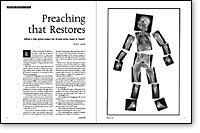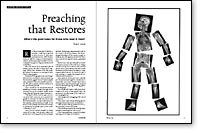
Rita Bass Coors paid $7,000 for a porcelain mask hand-painted by John Denver. It had been purchased at the 1997 Charity Celebrity Ball for Hospice of Metropolitan Denver. As the auctioneer handed it to her, it slipped through her fingers and shattered on the floor. The new owner of an expensive pile of broken pieces decided to keep them anyway. Rather than attempt to fix the mask, she placed the pieces in a montage of John Denver photographs. Preachers of the gospel must never forget that God is on a mission to find and pick up the shattered, jagged lives of broken people and transform them into something beautiful. The call to preach is God's invitation to be a part of that process. Jesus modeled the relentless task of preaching to broken people throughout his ministry, citing the prophet Isaiah as his God-ordained, personal mission statement: "The Spirit of the Lord is upon me, because he hath anointed me to preach the gospel to the poor; he hath sent me to heal the brokenhearted, to preach deliverance to the captives, and recovering of sight to the blind, to set at liberty them that are bruised, to preach the acceptable year of the Lord" (Luke 4:18-19, KJV). Jesus found broken people in every strata of his day. Rich young rulers and prostitutes. Grieving parents and prodigal children. Brokenness demonstrated itself in the lonely life of Zacchaeus, the sheet-draped shoulders of the woman caught in adultery, the self-righteous zeal of the Pharisees, and the ravings of a demon-possessed man. Brokenness was symbolized by heavy waterpots carried to the well by a village outcast and by the knotted, fish-scented nets of Simon Peter. Brokenness hid in both the hearts and the limbs of paralytics. It also masqueraded behind the robes of wealth and privilege in people like Joseph of Arimathaea and Nicodemus. Jesus spotted brokenness and carefully put the pieces back together. Sometimes it happened in an instant. Sometimes it was a process. But it was always through the good news of the health-giving, liberating, grace-centered gospel. This model still works 2,000 years later. People still need to hear good news. As preachers, we offer hope to the broken in our congregations: The single adult struggling with sexual temptation The senior adult whose lifelong partner no longer knows him due to Alzheimer's The student feeling pressure to fit in, who wonders if God even exists The childless couple who recently experienced a miscarriage but told no one The businesswoman tempted to adjust sales figures for larger commissions The father thinking about leaving his family The mother who is thinking about leaving life altogether. Preaching is the art of communicating to these people God's redemptive plan through Christ. Preaching testifies that broken people matter to God, and that God has pursued broken people in the past and continues to do so. Our best sermons are often delivered in the midst of the pain we go through with our people.
Brokenness, sudden or gradual
Brokenness can happen in an instant: "You're fired." "I want a divorce." "File for bankruptcy." "It's cancer." "She's dead." But brokenness isn't always that easy to detect. Medical experts tell us that a bone fracture may be the result of repeated, seemingly non-threatening abuse. We call these breaks stress fractures. Stress fractures have their origin in the misuse or overuse of the bone. Simple, repeated activities create microscopic cracks in the outer layers of bone, most often in the legs and feet. As the repetition continues, those small cracks are not permitted to heal. In time, they usually enlarge and cause great pain. A stress fracture is comparable to what occurs when you bend a pliable object. If you bend and re-bend a piece of metal, eventually the repetitive force forms a surface fracture and, ultimately, a complete break. It is easy to recognize the people who are broken by a sudden crisis. When we preach, they are aware of the brokenness and can apply our words of comfort or correction. Many times they are hungry for the preacher to address their specific need. They are broken, and they know it. The pain is great. They are looking for a word of hope. It is much harder to preach to those who are broken (or near the breaking point) due to a stress fracture. But the task is just as important. We must speak the words of grace and wholeness to those who are being bent over and over again by unhealthy relationships, unwise decisions, and destructive habits.
Cross-country casualties
The overcommitted and overextended are often broken, but they don't know it. They can keep going for a time, but not for long. Fatigue, grief, and discouragement are going to claim them soon. Preaching to the broken means preaching to these individuals too. I have pastored two congregations. My first was a new church plant in Las Vegas, Nevada, where I served for ten years. Roughly half the people had a strong Christian faith background when they joined our church. The other half had little or no religious background. Many of them were broken and empty when they found their way to our church, and they knew it. One such couple I'll call Chad and Jennifer. I first met them one Sunday morning. They were both in their early twenties, and they entered the worship center carrying a newborn infant between them. Chad was wearing shorts and a baseball cap. Jennifer had on a tie-dyed T-shirt and jeans. No make-up. Straight hair. I realized that I was looking at my very first "Gen-X" couple in that church. The service ended, and Chad and Jennifer left during the closing prayer, speaking to no one. To my happy surprise, they came back the following Sunday. I got to know Chad and Jennifer, and I had the privilege of introducing them to Jesus Christ. They were baptized and seemed to be making connections with members of their Sunday school class. A few weeks later, Chad came up after a worship service to ask if he and Jennifer could meet with me that week. I expected them to have questions about Bible reading or establishing a Christ-centered home. They surprised me. Chad and Jennifer sat down in my study and asked, "How do you balance a checkbook?" I was stunned. Chad's second question was, "I earn minimum wage sweeping up a garage each day, but I only work 17 hours a week. How do I get a better job?" Chad and Jennifer were textbook latchkey kids. Their parents were not around when they were young. No one made sure homework was being done. No one supervised their afternoons and evenings. No one ever discussed family finances, preparing for the future, seeking a career, or even applying for a job. They had tried to find happiness in other places, but it left them with brokenness instead. Since I didn't know much about their generation and was desperate to build a net under them, I began to research ways to minister and relate to "Generation X." I discovered a phrase that taught me more about preaching to and pastoring the broken than anything else. Someone in an online chat room said, "If you are going to pastor Generation X, you've got to do a lot of re-parenting." Preaching to these young adults requires the heart of a parent. They need a coach, a mentor, and a guide. In Las Vegas I discovered that many in my congregation had experienced brokenness in some form: divorce, abandonment, the death of a loved one, addiction, financial ruin, or poor choices. I remembered Rick Warren's words from a preaching conference: "Most people probably know how bad they are, but they need to hear how good they can become." I found receptive hearts every time I shared the good news. And the good news of the gospel is that broken people can be made whole in Christ! In my second pastorate in Nashville, I discovered the same thing. A world away, I now pastor one of the most historic congregations in my denomination. We are located in a city with five denominational publishing houses and multiple religious-affiliated colleges and seminaries. It's the buckle of the Bible-belt. But brokenness is still prevalent. I could tell you about Karen, in her third relationship with a man who was not her husband. Or the parents of jailed sons. Or the businessman who is in his second marriage and still hasn't broken the habit that will one day result in another divorce. Or the homeless woman who sleeps at our doorway. Adultery, homosexual activity, chemical abuse, pornography addiction, gambling, and numerous other indications of brokenness are all here. And they are not limited to cities with lots of neon. You will preach to broken people this Sunday, too.
Grace plus correctives
Jesus didn't approach the task with a one-size-fits-all message. He spoke of living water to the woman at the well, he used bottom-line language to the financially minded tax collectors, and he painted mystical images for the religious seekers who came to him by night. Our call to preach demands that we be just as creative. Regardless of your preaching plan, you will find the themes of starting over, second chances, and new beginnings on almost every page of the Bible. Broken people need to know that God is like the patient and loving father in Jesus' parable about the two sons. Find ways to simplify the essence of the gospel. Remember that Jesus was not a three point preacher; he normally made one point. He told stories, he used humor, and he found images that people could understand and identify with. He fit the message to the audience. And all the while, he demonstrated the character of holiness and servant leadership. In preaching to the broken where you live, offer them the same thing. Be real, be yourself, and be grace-centered. Let the Bible speak to the hurts. Stress fractures are healed by prescribing rest and by removing the weight that routinely impacts the bone. Once the fracture heals, the bone is stronger than before; but unless the lifestyle that caused it is corrected, it's going to break again. Preaching to the broken not only provides a note of grace, it must also be instructive and corrective. We once equated evangelism with preaching for a one-time decision. This is no longer the case. Decision is not the destination; decision is the beginning of the journey.
What makes a pot a prize?
I once read of an interesting antique pottery collection. The most expensive vessels were from a collection of Early American pieces that had been repaired by the original owners long ago. Pictured in this article was a cracked clay pitcher bound together by fence wire, an earthenware jug patched with wax, and a wooden bowl repaired with a crude, but effective, leather stitch. The value of the collection was in the imperfection. Even though broken, they were carefully put back together and made usable. As a result, they were even more valuable now. This is what Christ does with broken people. We have become what Sue Bender in Everyday Sacred calls "an imperfectly perfect bowl." She once saw a Japanese tea bowl that had been broken and pieced together. The image of that bowl made a lasting impression. Instead of trying to hide the flaws, the cracks were emphasized—filled with silver. The bowl was even more precious after it had been mended.
Frank Lewis is pastor of First Baptist Church of Nashville, Tennessee.
Copyright © 2001 by the author or Christianity Today/Leadership Journal. Click here for reprint information on Leadership Journal.










